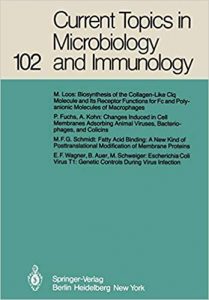نام کتاب: Current Topics In Microbiology And Immunology 102
نویسنده: Michael Loos و M. Cooper و P. H. Hofschneider و H. Koprowski و F. Melchers و R. Rott و H. G. Schweiger و P. K. Vogt و R. Zinkernagel
ویرایش: ۱
سال انتشار: ۱۹۸۳
کد ISBN کتاب: ۹۷۸۳۶۴۲۶۸۹۰۸۶, ۹۷۸۳۶۴۲۶۸۹۰۶۲
فرمت: PDF
تعداد صفحه: ۱۵۴
انتشارات: Springer-Verlag Berlin Heidelberg
Description About Book Current Topics In Microbiology And Immunology 102 From Amazon
Binding of various ligands (hormones, neurotransmitters, immunological stimuli) to membrane receptors induces the following changes: 1. Receptor redistribution (clustering, “capping”) 2. Conformational changes that can be detected by fluorescent probes 3. Alteration in membrane fluidity (spin label and fluorescence polarization probes) 4. Changes in fluxes of ions and metabolites 5. Increased phospholipid turnover (especially of phosphatidyl inositol) 6. Activation of membrane-bound enzymes (adenyl cyclase, ATPase, transmethylases). Some of the early changes resulting from or associated with the binding (adsorption) of virions to the host cell membrane are of the same type. Adsorption of animal viruses to cells is the ftrst step in a chain of events resulting in the production of progeny virus on the one hand and in damage to cells and tissues on the other. In the classical studies of viral infection, cells are adsorbed with virus, usually for 60 min, and the changes induced by the virus in the host cell are recorded thereafter. In the past decade, more and more studies have been aimed at the events occurring in these ftrst 60 min of the so-called adsorption period. These studies deal with the nature of adsorption, e. g. , the ligand-receptor type of interaction between the virus and the cell membrane. Many receptors for viruses were identifted and so were the viral proteins which take part in adsorption.
درباره کتاب Current Topics In Microbiology And Immunology 102 ترجمه شده از گوگل
اتصال لیگاندهای مختلف (هورمون ها، انتقال دهنده های عصبی، محرک ایمنی) به گیرنده های غشاء باعث تغییرات زیر است: ۱٫ گیرنده توزیع مجدد (دسته بندی، “دربندی”) ۲٫ تغییرات کنفورماسیونی که می تواند توسط پروب فلورسنت ۳٫ تغییر در سیالیت غشاء (چرخش برچسب و قطبش فلورسانس پروب) ۴٫ تغییرات در شار یون و متابولیت ۵٫ افزایش گردش مالی فسفولیپید (به خصوص اینوزیتول فسفاتیدیل) ۶٫ فعال سازی آنزیم غشاء محدود (adenyl سیکلاز، ATPase و transmethylases). برخی از این تغییرات اولیه ناشی از یا در ارتباط با اتصال (جذب) از virions به غشاء سلول میزبان از همان نوع است. جذب ویروس ها حیوانات به سلول گام ftrst در یک زنجیره ای از حوادث و در نتیجه تولید ویروس فرزندان از یک سو و در آسیب به سلول ها و بافت از سوی دیگر است. در مطالعات کلاسیک عفونت ویروسی، سلول ها با ویروس جذب، معمولا به مدت ۶۰ دقیقه، و تغییرات در سلول میزبان ناشی از ویروس پس از آن ثبت شده است. در دهه گذشته، بیشتر و مطالعات بیشتری در حوادث در این ftrst 60 دقیقه از به اصطلاح دوره جذب رخ هدف شده است. این مطالعات با ماهیت جذب، الکترونیکی رسیدگی کند. گرم. ، نوع لیگاند گیرنده از تعامل بین ویروس و غشای سلولی. بسیاری از گیرنده های برای ویروس ها identifted شد و بنابراین پروتئین های ویروسی که در بخشی از جذب شد.
[box type=”info”]![]() جهت دسترسی به توضیحات این کتاب در Amazon اینجا کلیک کنید.
جهت دسترسی به توضیحات این کتاب در Amazon اینجا کلیک کنید.![]() در صورت خراب بودن لینک کتاب، در قسمت نظرات همین مطلب گزارش دهید.
در صورت خراب بودن لینک کتاب، در قسمت نظرات همین مطلب گزارش دهید.

